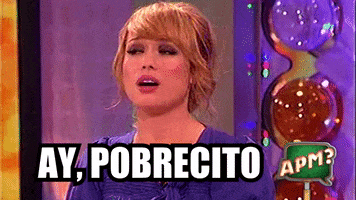LEARNING a language is a lot like spraining an ankle: it’s painful and takes ages to get better.
But every language learner will hit a tipping point when suddenly they jump and shout for joy.
Some say it happens when you dream you first dream in a foreign language.
Others say it’s the pride of correctly insulting someone.
But more often than not it occurs as you spit out a word in your native tongue and get stuck.
Not because your brain has had enough, but because there’s just no translation for the foreign word you’re trying to say.
The word has a je ne sais quoi about it.
(See what we did there?)
Here are 15 genius words in Spanish that just don’t mean the same thing in English.

1. Pesado
If you’ve every tried to find the word for ‘annoying’ in Spanish you might have seen pesado.
Literally, though, the word just means ‘heavy’.
But this works in the word’s favour especially when someone’s energy is stifling a situation or just bringing everyone down.
The best part is in feeling the weight just lift off your shoulders with this satisfying insult.
Example
Dame el mando ya, ¡pesado!
Give me the remote already, annoying person!

2. Desmadre
If there’s any word that best encapsulates Spain’s love of family – and especially for one’s mother – it’s captured in the verb desmadrar.
Literally it means to ‘de-mother’.
It can describe separating a baby animal from its parent but more commonly means ‘to ruin’, ‘to mess up’ and even ‘to fall apart’.
Cute, right?
Except that desmadre or ‘unmothering’ has since come to mean ‘rampage’ in Spanish and particularly when referring to an incredible night out.
Example
¡Vaya desmadre que tuvimos anoche! Que dolor de cabeza.
What a mental unmothering we had last night! I’ve a stinking headache.

3. Hijo
To conclude the topic of family terms in Spanish, the word hijo meaning ‘son’ and hija meaning ‘daughter’ are real terms of familiarity in Spain.
Generally used by older people referring to younger acquaintances, it’s a word similar to ‘love’ or ‘sweetheart’ in English but shows perhaps even more affection and concern.
You can add on a possessive mío at the end to get really intimate.
Example
No, hijo mío, no he visto tus llaves por aquí.
No, my son, I haven’t seen your keys around here.

4. Manco
Manco is not an earth-shattering word in Spanish: it means a one-armed man.
But the English translation is so laborious it seems silly to anyone who’s learnt the speedy Spanish equivalent.
Since we’re on the subject, tuerto similarly means a one-eyed man.
It sounds so long doesn’t it? A one-eyed man?
There is a phenomenon in Spain of one-eyed bullfighters who gave half their vision to a bullhorn, but let’s not make generalisations.
Both manco and tuerto have their origin in Latin and just never made it to the British Isles.
(To talk about a female, change the ‘o’ to an ‘a’ – manca, tuerta.)
Example
¿Has visto el manco hoy?
Have you seen the one-armed man today?

5. Cagado
We’ve already covered the strange Spanish phrases about ‘pooing in the milk’ elsewhere.
But the word to, ahem, use the bathroom has an incredibly rich range of uses without verging into swearword territory.
A terrible situation can be a cagada or a ‘pooing’ for example, while a cagado is a fantastic way of referring to a terrified person.
It captures the essence of when English people say they ‘wet themself’ with fear, but with a little more oomph.
Example
No ha mirado su cuenta bancaria aún, esta cagado de miedo.
He can’t bring himself to check his bank account yet, he’s pooed with fear.

6. Bocachanclas
Bocachanclas is a fantastic word that literally means ‘flip-flop mouth’.
It’s akin to the English ‘chatterbox’ except that the association with flip-flops add in an extra air of cheapness and uncleanliness.
An extremely satisfying insult that can also be shared among friends.
Example
¡Cállate ya que estoy conduciendo, bocachanclas!
Shut up while I’m driving, flip-flop mouth!

7. Trasto
Trasto is a gorgeous insult that literally means ‘junk’ but refers to anyone who is generally a waste of space.
The superiority over ‘waste of space’ is the visual imagery of the person as an old suitcase or cardboard box you trip over in the hallway.
Example
Eres un trasto hijo, vete a buscar trabajo.
You’re a waste of space son, go find a job.

8. Chungo
You won’t get very far in Spain without knowing the word chungo.
It’s one of many Roma words commonly used in Castilian Spanish, and literally means ‘disgusting’ or ‘repulsive’.
However you’ll hear Spaniards turning to the word at the first sight of any troubling or tricky situation.
Example
¿Que chungo las obras no? ¿En pleno verano encima?
How terrible the roadworks no? And in the middle of summer?

9. Fuerte
After you hear your first fuerte in Spanish it’s like the floodgates open.
Everything in Spain seems to be fuerte or ‘strong’.
Fuerte this, fuerte that, fuerte that man, and fuerte his dog too.
Far from being a positive attribute, if something’s fuerte it’s generally not very good at all.
Most Spanish people will use it to complain, to criticise or to gossip about anything.
Example
Mira todas las turistas en playa, ¿que fuerte no?
Look at all the tourists on the beach, how awful no?

10. Empanado
Empanado is a word you’ll find on menus as it means ‘breaded’ (think schnitzel).
Yet you wouldn’t want anyone calling you empanado in Spain.
It’s usually hurled as an insult for anyone distracted, away with the fairies, momentarily blocked for ideas or just a confused soul.
Once you know it, the visual imagery of a person’s head all breaded over is too delicious to forget.
Example
¡Oye empanado, que te vas a chocar contra la pared!
Hey stupid, you’re about to walk into the wall!

11. Friolero
Friolero is such a fantastic word it’s amazing no one’s thought of it in frosty old England.
It’s derived from the word frio or ‘cold’ but means anyone who doesn’t like chilly weather or temperatures (which is likely anything under 20°C in Spain).
It’s a useful word expats in particular can use to explain why they love living here.
Example
Es que soy muy friolero para aguantar el invierno in my país.
I’m too anti-cold to bear the winters in my country.

12. Pobrecito
Pobrecito is another extremely common Spanish word you can’t directly say in English.
Translated most closely it would be ‘poor soul’ or ‘poor you’ or ‘poor thing’ depending on context, but Spanish simplifies it all with a simple pobrecito or pobrecita.
It’s a great word that can be used to express care or concern for another – especially when mío is added on the end.
Example
Ay pobrecita mía, ¿como que te sales a correr con el calor que hay?
Oh my poor thing, what ever made you go on a run in this heat?

13. Vergüenza Ajena
While the Germans have their Schadenfreude (taking pleasure in other people’s misfortunate) the Spanish are much more empathetic.
Vergüenza ajena refers to the embarrassment or ‘foreign shame’ you feel for some other poor soul.
It could be translated into English as ‘cringeworthy’ but implies a much stronger shared bond.
Example
Cada vez que veo el pobrecito hablando Español siento vergüenza ajena.
Every time I see the poor guy trying to speak Spanish I feel embarrassed for him.

14. Cochino
Cochino is a word that in some Spanish-speaking countries means ‘pig’ but in Spain can be affectionate way to call someone messy or unkempt.
Okay, you can use it to call someone downright disgusting too, don’t worry.
It’s a word you might often hear dogowners calling their dogs in the sense of ‘mucky pup’ when they roll their muck all in your bed sheets.
But it can also be used to describe a generally dirty establishment or to gossip about other people’s hygiene.
Example
¿Has visto que cochinos tiene sus niños esa tía?
Have you seen how dirty that woman’s children are?

15. Cotilla
If there’s one activity everyone’s grandma is up to in Spain it’s curtain-twitching.
Spying on other people and gossiping about it after are so popular in Spain that both activities only need one verb: cotillear.
The word you’d call a gossip or curtain-twitcher is cotilla.
There’s even a popular gossip mag in Spain called Cotilleo or ‘gossip’ who’s byline unashamedly reads ‘we are gossips by hobby and by profession’.
Example
Para ya de espiar la nueva piscina de los vecinos, ¡que cotilla que eres!
Stop spying on the neighbour’s new pool, you’re such a curtain-twitcher!
READ MORE:
- Valenciano: 12 words and phrases you need to learn to impress the locals in Spain’s Valencia region
- QUE? 10 Spanish phrases that make no sense in English
- 10 Spanish expressions you might not know










